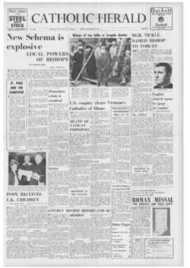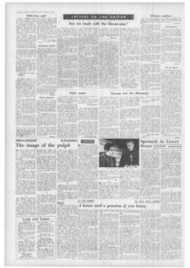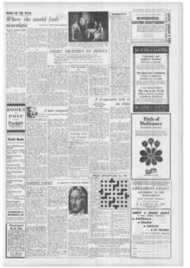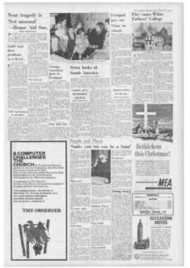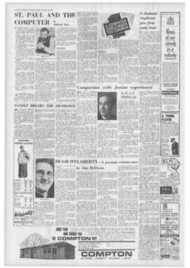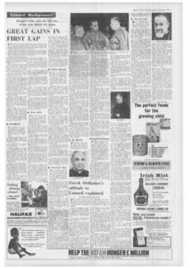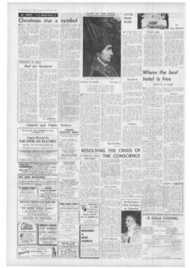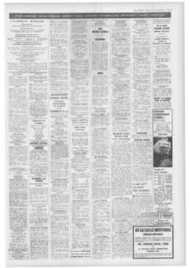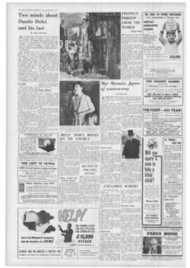Page 7, 8th November 1963
Page 7
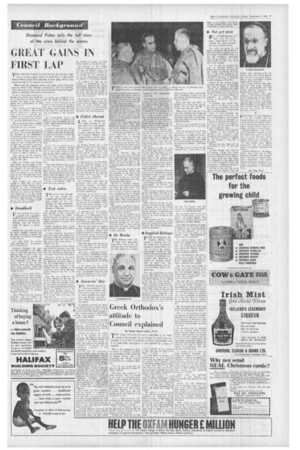
Report an error
Noticed an error on this page?If you've noticed an error in this article please click here to report it.
Tags
Share
Related articles
A Diary Of The Council
New Moves To End A Procedural Stalemate
The Vatican Chief Who Will Lie For No One
Ope Of The Space-age
The End Of The Beginning
GREAT GAINS IN FIRST LAP
THIS week the Vatican Council reached the half-way stage of its second session. Some 23 more days of discussion remain before Pope Paul adjourns it once again. How is the session going? h it a success or a failure?
These were the questions which were being asked during the four-day break from Thursday evening last until this morning. The interval gave those inside and around the C'ouncil an opportunity of seeing the half-session in perspective.
As the Fathers dispersed for the break, many of them leaving Rome for a few days in other parts of Europe. they were in two minds about the achievements of the Council so far.
They looked at their diaries and saw that one schema—that on the Church had taken 23 days to debate. Certainly it was the key schema of the Council. Its effects will be felt throughout the Church for perhaps centuries to come.
But much of the precious debating time had been taken up with irrelevancies and repetition.
And even then the work was only half-done. The schema has still to be amended in the Theological Commission, the amendments have to be brought back to the Council and voted on: the new suggestions made on this voting have to be studied and if acceptable embodied in the schema and. finally, the individual chapters of the schema have to be brought back to the Council for final acceptance.
That processas the liturgical schema has shown—will take at least another year.
How. the Fathers were asking each other. can we expect to get through the other 16 schemata on our agenda? At the-rate we are going, we can reckon on finishing only one schema a year, By the time we have finished what is before us now, it will be time for Vatican III,
Many Fathers, too. were perturbed at what they fell was a lessening of public interest in the Council in the non-Catholic world. The newspapers were giving less and less space to the Council and relegating it to the inside pages. One American bishop spoke for many when he said: "11 things go on like this, we might as well all pack up and go home".
• Deadlock
IT was against this back"ground, with a groundswell of anxiety and frustration mounting among the Bishops, that the Council came up against a major crisis.
Superficially the crisis was over procedure; actually it sprang from the deep division of opinion between the two schools of thought in the Council.
Last year, these . two schools were described as "progressive" and "conservative".
However inaccurate the labels are, they expressed a real difference of approach between those bishops who, in good faith. fear that the Church is moving too quickly in the direction of the "new theology" and those who believe that it is only the new thinking which can meet modern man's deep spiritual needs and equip the Church to meet the challenges of today, Since it is often easier from a newspaper point of view to project personalities rather than policies. the "conservative" thinking became identified with Cardinal Ottaviani, president of the Theological Commission, which has the task of re-writing the schema De Ecclesia in accordance with the Council Fathers' intentions.
Many bishops felt that Cardinal Ottaviani did not regard the General Congregations of the Council—that is, the daily sessions —as having any legislative function but merely an advisory one.
Much of the frustration in the Council centred around the belief that the Theological Commission was being used to delay the work in the hope that time would dissipate the energies of the "progressives".
The Commission. whicth can meet only at the summons of its President, was convening just once a week. Many bishops felt this was far too infrequent.
It was also said that the texts of the bishops' speeches. from which the Commission and its sub-commissions would have to collate the proposed amendments to the schema. were not being circulated to the Commission for 12 days at a time.
Faced with the possibility of a deadlock. the Council Fathers looked for a focal• point of authority in the Council itself to solve the impasse. They found none. For there has been a major structural weakness in the Council—the' lack of any clear hierarchy of authority.
Three instruments of power were created in the Council—the Secretary-General. the I 2-man Presidency Council and the four moderators. The rules did not make clear which took precedence. With the work becoming bogged down in repetition. irrelevance and inaction it became increasingly urgent to settle this vital question.
• Test votes
THE. crisisbroke. though no one outside the Council and very few inside were aware of it — on October 15. The moderator for the day was Cardinal Suenens of Brussels.
He told the fathers that it had been decided to seek a test-vote from the Council by which it would manifest its mind on four specific points which had been widely discussed on Chapter 11 of De Ecclesia.
Papers detailing these points would be distributed to the Fathers next day for study.
Cardinal Suenens's intervention went unnoticed in the official communique for the day, though it was mentioned in the oral press briefings given after each session. It created little stir.
Most journalists and the bishops they talked to accepted it as a sensible step to speed up the work and help the Theological Commission in its task of re-writing the schema.
The exact nature of the points themselves was not disclosed. It was generally accepted, however, that they would relate to the sacramentaliry and collegiality of the bishops and the question of the diaconate—issues which had been keenly debated on the floor of the Council.
Next day the moderator was Cardinal Agagianian, He told the Council that, even though discussion nn Chapter If had been closed the day before by general consent, several Council fathers had invoked Article 57, sub-section 6 of the rules which permits bishops to speak on a "closedchapter if they do so in the name of at least live other bishops.
Because of this, the four points from the chapter to he submitted to the Fathers for study and later voting would not he distributed.
On October 17. the Fathers received complimentary sets of a new issue of Vatican stamps, the first of the Pontificate of Paul VI, On October 18. they received the text of the amendments proposed for chapter 4 of the liturgy schema.
On October 22, they got the Chapter V amendments and a monograph detailing the various forms of lay apostolate throughout the world. But there was no sign of the paper detailing the points on which the Moderators wanted the mind of the Council,
By now, the journalists and some of the bishops began to get suspicious about the delay. Questions about the "four mystery votes" were Mel with ',cutest incomprehension by the official spokesmen. No one knew what was happening.
• Felici threat
LATE on Wednesday night, October 23, the first hints of a real behindthe-scenes crisis leaked out. 1 remember this with chagrin, since by that time the CATHOLIC HERALD had "gone to bed" and the story would not make that week's issue.
It became known that a full meeting of the Council's authori
ties -Moderators, Presidency Council, Secretary-General and Cardinal Brown, as Relator of the De Ecclesia schema—had been held that evening. The crisis was in the open.
It transpired that the Presidents and the Secretary-General were ranged against the moderators on the question of the test-votes. One critical fact emerged: the moderators had decided on the test-vote procedure themselves and had not consulted the Presidents and Secretary-General about it.
The Presidents had ruled the procedure ultra vires, and the Secretary General, Archbishop Felici. had, according to report, threatened to resign if his authority was to be undermined.
Next day in the Council, Cardinal Doepfner. the day's moderator, made an announcement. Several bishops, he said, wished the doctrine on the Blessed Virgin Mary to be made a chapter of the schema on the Church rather than a separate schema by itself.
In agreement with the moderators, be continued, the Cardinal President of the Theological Cornmission (Cardinal Ottaviani) had designated two members of the Commission to present the pros and cons concerning this proposal.
This was then done by Cardinal Santos, Archbishop of Manila (urging a separate schema) and Cardinal Koenig of Vienna (urging incorporation in Dr Ecclesia) and it was announced that a vote would be taken on the proposal early the following week.
That Thursday night, Rome was speculating wildly. as only Rome can, on what this apparent change of heart could mean.
On Friday afternoon. POsservatorc Romano carried the intimation that the four moderators had that afternoon seen the Pope. Evidently the crisis was by no means over.
It was learnt, too. that several bishops and national conferences of bishops had become so anxious about developments that they had gone to see the Pope or sent a representative to ask him to intervene.
• Suenens' day THE weekend passed in intense speculation. The Rome weather changed and there was a nasty nip in the air. Many people went down with sore throats and influenza. Most were feeling in low spirits.
On Monday morning. St. Peter's was filled at 8.30 a.m. There was no Council meeting that day. At short notice, Pope Paul had arranged to say a special mass in commemoration of the eleetion of his predecessor, John XXIII.
Cardinal Suenens, now identified as the leader of the moderators and of the "progressive" group of bishops. was to give the address. The night before, the Pope and the Cardinal had dined alone.
Despite the beauty and solemnity of the occasion, the excitement in the Basilica was almost palpable. The bishops stood and clapped as the Pope strode in, small and almost lost behind the halberds of his guards and the antiquated court-dress of h i s attendants.
As he said the introductory prayers before mass, he lost his place and skipped most of Psalm 42. Someone whispered to me that he was not used to saying it since he celebrated his private mass in the Ambrosian rite of Milan. The Pope blushed and went on.
After mass, Cardinal Suenens mounted the pulpit erected opposite the statue of St. Peter and in front of the assembled ranks of cardinals and bishops. He looked impressive. dignified. perfectly calm. He put on his glasses. took nut his manuscript, looked straight un at Pope Paul on his throne on the Papal Altar and began his address.
His speech has been reported. But no amount of commentary could do justice to its quality. It was not only a moving speech. It was shot through and through with nuances which only someone who had lived in close touch with the crisis of the previous week could have appreciated.
Cardinal Suenens reminded his hearers that many of them regarded Pope John, on his election. as a transitional Pope. He had indeed
been transitional, Cardinal Suenens said, since he had opened a new era for the Church and laid the foundations for the transition from the twentieth to the twenty-first century. The point went home.
John had died, the Cardinal continued, but he was Atilt present in their midst in the person of Pope Paul, who was continuing his work and who had been given to the Church "to give form and substance to the prophetic intuitions of his predecessor".
The words were gentle. but the meaning was clear. Pope Paul should not hesitate to lake whatever action would be necessary to put the agefornainerao into effect.
Cardinal Suenens made the point clearer. Pope John, he said. had once remarked that his personal part in the preparation of the Council would be suffering. Again the implication was obvious. Pope Paul would suffer if he had to act in a way which might hurt or offend others. Hut such suffering might be inescapable.
Cardinal Suenens told his hearers that it was right and fitting. they should ask Pope John to intercede with God that the Council "should evolve and come to perfection in entire docility to the thought and desires of God for His Church".
The Roman ear. attuned to the nuance. understood. Those who were standing in the way of the aggiornamento, to which Pope John had devoted his pontificate, should ask themselves were they opposing the Holy Spirit.
And so on. Cardinal Suenens. speaking in clear but not overbearing tones, put home point after point with the delicacy of a surgeon. It was a brilliant performance, nonetheless effective because it was redolent with the same charitable and open spirit which was Pope John's. The whole Basilica clapped him enthusiastically as be ended.
Then came a significant episode. As Cardinal Suenens left the pulpit. the Pope stood up. He was smiling broadly, almost boyishly.
Sn. too, was the Cardinal as he strode up with long steps to where the Pope was waiting, knelt to kiss his ring and then stood up to he embraced warmly by the small. white-clad figure. It was a moving scene, full of human feeling. The Basilica echoed with another round of applause.
• De Beata THE Bishops came, saw, and were persuaded. Pope Paul had made his position clear. He had given his full support to Cardinal
Suenens. The moderators had won.
Next morning in the Basilica, the extent of the victory became clear. Archbishop Felici announced that "by order of Their Eminences the Moderators", a sheet containing certain propositions on the contents of Chapter II of the schema on the Church would be distributed and that voting on them would take place the following morning.
By now, the "four mystery-votes" had increased to five. Four concerned the stteramentality and collegial power of the bishops: the fifth was on the diaconate.
The Archbishop stressed, howtie et. that the soles would not imply iipprosal or rejection of any particular text on these points. They would serve only to indicate the general mind of the Church on them and would "assist" the competent Commission in its revision of the text.
The decision to take the votes was a clear sign that the moderators now had the prime authority in the Council. The "progressives" were elated. Their elation was short-lived. A few minutes later ballot papers were distributed for the vote on where to place the doctrine on the Blessed Virgin Mary— in the De Ecclesia schema or as a separate schema.
No other proposition before the Council so far had been so widely canvassed outside it. The bishops themselves were engaged in intense lobbying. Opinion seemed split down the middle.
Some bishops thought that Mary "transcended" the Church and should therefore have a separate schema.
They felt that by merely appending the "De Beata" doctrine to the De Ecclesia schema, it would be regarded as a sort of afterthought and that Mary would thus be demoted.
Other hiehops felt that by putting her in the De Ecclesia schema her rightful place in the Church would be seen more clearly and that the excesses of distorted and unliturgical Marian piety in some parts of the world would be discouraged.
They pointed out that if Mary had a separate schema and her Son had none, a totally false idea of her place in the Divine dispensation would be projected.
• English bishops
FROM the beginning, the English Bishops had played a leading part in the controversy. Concerned equally to present Mary in a way in which her dignity and beauty would he best seen by the most people and to prevent the doctrine concerning her becoming a source of division rather than of unity with our separated brethren. they had come to Rome with a prepared text.
this text, compiled at the initia1 e of Abbot Butler of Downside, had the full support of the English and Welsh bishops. It was offered as the text for a new chapter on Mary in the De Ecclesia schema.
The secretariat of the 'Hierarchy had worked hard and long to circulate 1,600 copies of the text and to win support for it. When IOU signatures were obtained — the minimum necessary was 50 — the text was submitted to the moderators. Sn, too. was one from the
Chilean bishops. Many other drafts were circulating, notably one by the leading French theologian, Fr. Rene Laurentin.
When the vote was taken on October 29, a close result was expected. But no one thought it would be as close as it was.
There were 2,193 votes cast. Five were null—bishops kept forgetting that they must make their mark on the ballot paper with a special magnetic pen which records in the calculating machine.
Since it was aprocedural question, a majority of 51 per cent was sufficient.
After the Secretary-General had announced the result, there was deep silence in the Basilica. A mere forty votes separated the two groups, 1,114 bishops had voted for incorporating the doctrine in the De Ecclesia schema; 1,074 were against.
Though it was a victory for the "progressives", it was only a nom inal one, The Council. they felt, was still so divided that the aggior'lament° was being forgotten.
But the experts did not lose confidence. The De Beata issue was a special one, they insisted. The Italian and Spanish bishops had voted for a separate schema.
They had the support of some, perhaps half, of the Latin American bishops, who were persuaded by the false argument that to put the doctrine in the schema of the Church was "de-emphasising" Mary's role in the Church.
The Italian papers had not helped. By castigating as "minimalists" the English Hierarchy for their text. they gave the impression that unless the, Marian doctrine were treated in a special schema, Mary was being slighted.
Wait till tomorrow, the experts urged. and you will see that the five test votes will be passed with large "progressive" majorities. Their confidence was justified.
The five votes were solidly in favour of the new thinking. Even on the diaconate proposal, which had the strangest negative vote, three-quarters of the fathers supported the "progressive" view. Spirits soared again, The next day was Wednesday, October 30. the last meeting before the four-day break. Evidence of the moderators' new authority was soon forthcoming. Cardinal Dneprner announced that many fathers —25 in all—wished to exercise their right of speaking, in the name of at least five others, on Chapter IV of the De Ecclesia schema, which had been closed the previous clay.
But, he pointed out, many complaints had been received that the work was proceeding too slowly.
While it was necessary to protect freedom of speech, the moderators had also to see that the wishes of the majority of the fathers, who had indicated their wish to close the debate on the chapter, were also respected.
He therefore told the speakers that the warning buzzer would sound after six instead of the customary eight minutes and advised them to be brief. relevant and not to repeat points already made. He was loudly applauded. Within the next two hours he had stopped two speakers who did not obey this ruling. The moderators were putting teeth into the rules.
In another move el speed the work, Cardinal Dnepr n er proposed that instead of voting individually on the six amendments to Chapters 6 and 8 of the liturgy schema (on sacred art and furnishings), the Council should combine the two chapters. accept the amendments on them without a vote and vote instead on the combined chapter as a whole, Again there was applause. Clearly, the new impetus was approved by the majority of the fathers.
Clearly, too, the Moderators were determined to drive their victory home. They were asserting their authority in the Council as a Fact. whether or not the rule-hook provided for it. Everyone knew that Pope Paul, without publicly displaying his hand, had acted behind the scenes,
Other proofs of this had also been given. The Theological Commission had received a message from the Pope that he expected it to increase the pace of its work. Sub-commissions were immediately appointed and the arrears of work began to be tackled, The breakthrough looked like being transformed into a major advance.
• Not yet won
BUT the battle has not yet been won. The procedural organisation of the Council was proving more and more unsatisfactory.
The work was going far too slowly and despite the moderato's' efforts it could be speeded up only to an extent. Some bishops felt, too. that the procedural weaknesses were being exploited for policy reasons and that the rules would have to be changed.
Late at night the eonsullaiions a cm on, between bishop and bishop and between one hierarchy and another. Just before the interval, a joint letter, signed by the representatives of 25 hierarchies, was sent to the Pope. It 'proposed a major change in procedure.
Instead of the present system whereby bishops get up one after the other to debate a particular chaplet, the suggestion was made that as soon as a chapter was accepted for debate the pros and cons of its main provisions should be explained by experts, either bishops or theologians who knew the issues.
A precedent had already been provided in the discussions on the Dr Beata when Cardinal Santos of Manila and Cardinal Koenig had addressed the Council.
Then, it was proposed. the debate should be thrown open for two or three days in full Council, Next it should be discussed in national or regional episcopal conferences, to he held on two days of the week, during which the full Council would not meet.
Each conference would appoint a speaker to put forward its majority and minority views though the way would be left clear for individual bishops to address the full Council if they felt it necessary.
Perhaps the new ideas will be introduced in time for the next session.
As they thought back over the half-session during the break, Council fathers then had reason for optimism. Despite all the difficulties, great gains had been made. The collegiality of the bishops had now been recognised. From that would stern a whole new system of government in the Church.
On top of that, the role of the layman in the Church's life and mission had emerged with far greater clarity and nobility than it had over been expressed before. That, in turn. could lead to a great renewal of Christian life.
The liturgy schema had been completed and would probably soon be promulgated and this would certainly transform the spiritual life of the Church. The achievements had been enormous: the setbacks unimportant by comparison. As the fathers came back to St. Peter's this morning. they had a deeper and better understanding of the great work they had been doing. The eggiornamento was slowly but surely becoming a reality.
FOOTNOTE: Cardinal McIntyre of Los. Angeles told the Vatican Council on Tuesday that 0 proposal to decentralise authority in the Catholic Church was a radical change which might endanger the unity of the Church.
Cardinal McIntyre, one o/ the most conservative members of the U.S. Hierarchy, spoke in the debate on a new document which would enhance the authority of bishops to run their own dioceses.
It also would grant official recognition and real legislative powers to national conferences of bishops.
Cardinal Richaud of Bordeaux, France, led a long list of West European Liberals who strongly defend the idea of national Episcopal conferences, and argued that the document should go even further in freeing bishops front undue interference by the Roman Curia.
[See Page One]
blog comments powered by Disqus


